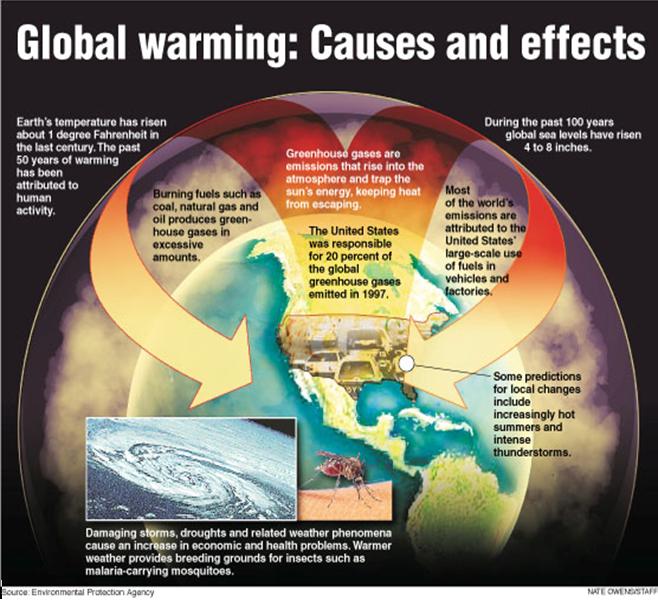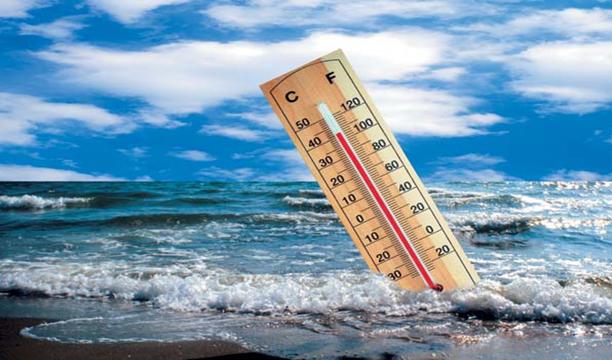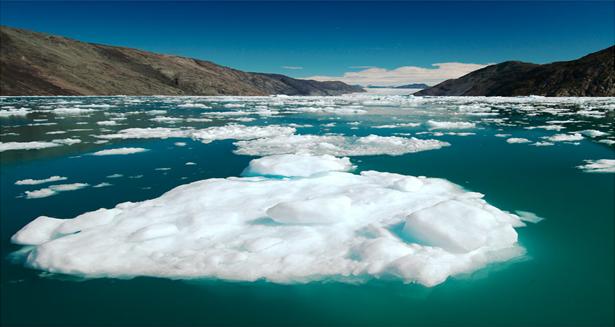TEXT2. GLOBAL WARMING

What a week of weather it has been. What a month. What a year. Deluges, droughts, fires, landslides, avalanches, gales, tornadoes. Is it our imagination or is Europe's weather getting worse?
The short answer is yes, the weather certainly is getting worse. The cause is air pollution that pours greenhouse gases such as carbon dioxide and methane into the atmosphere to produce global warming that can alter weather patterns. Most climate experts agree that so-called extreme weather events are becoming more frequent and that the weather worldwide over the coming 100 years will change drastically.
Europeans can expect more rain and flooding in the north as well as drought and desertification in the south. Glaciers will melt in the Alps, parts of Spain and Italy will turn as dry as the Sahel, forests will thrive in Sweden and tornadoes will rip up trees in places like Bognor Regis. The scientists say that even if the world's governments and industries meet international goals on reducing greenhouse gases – which they probably will not – it still won't be enough to prevent severe changes to the world's weather. Their advice to governments, businesses and private citizens about this is grim - get used to it.
A landmark report released last week by a team of 27 European climatologists warns that the trend in global warming may be irreversible, at least over most of the century. That, they say, means governments should start planning immediately to adapt to the new extremes of weather that their citizens will face – with bans on building in potential flood plains in the north, for example, and water conservation measures in the south. "We make almost 50 recommendations for policy and research in this report", says Martin Parry, a scientist at Britain's University of East Anglia. "It really is imperative that we take the first steps in adapting to climate change now."
That represents a subtle but significant shift in attitudes toward global winning and some activists are dismayed at the suggestion that the world should adapt to the warming trend rather than try to halt or reverse it.

Parry and his colleagues say there will be a general warming of Europe with much wetter weather in the north and much drier conditions in the south. That will mean extensive northern flooding while parts of the agriculturally productive south will turn into near-desert. In the Alps much less water will be held on mountains in the form of snow and instead will run off to feed devastating flash floods. Alpine glaciers will melt and tundra from Lapland to Siberia will vanish. The level of the Mediterranean Sea will rise half a meter by 2050, inundating coastal wetlands and wiping out whole species of bird and sea life.
"There will be a south to north shift of climatic resources", says Parry. "This will change the political geography of the Continent. The most adverse effects will be in poor rural areas, the least adverse in wealthy urban areas. That's the global situation as well – dry areas getting drier, wet areas getting wetter."
Africa will suffer in ways that scientists cannot fully predict, but it will probably become even drier and more prone to drought and famine than it already is. For Europe that will mean a growing influx of hungry Africans who could come to be known as "weather refugees".
Some argue that the ultimate result of global warming will be a paradoxical but even more catastrophic development - global cooling. As the arctic ice cap melts, a flow of fresh water into the North Atlantic could disrupt conveyer currents including the Gulf Stream which is what keeps Northern Europe warm. "There is an argument that short-term global warming could actually lead to long-term cooling", observes Steve Hall, an oceanographer at Britain's Southampton Oceanography Centre. "One moment we are basking in a Mediterranean climate and the next, icebergs are floating down the English Channel."

But the growing scientific consensus is that momentous changes are coming. Not all of them, however, are bad. Forests of Scandinavia and northern Russia will grow faster and farther north than before helping draw off CO2 "We may have longer growing seasons in northern latitudes which farmers can exploit to have more than one harvest in a single year", says Michele Bernardi, an agrometeorologist at the UN's Food and Agriculture Organization in Rome. Indeed, some of the climatic changes will produce limits on emission: soil left fallow in the hotter south will serve as a "sink" to absorb CO2. Heating needs will plummet in the warmer north greatly reducing emissions – although high heat in the south will turn on millions of C02-spewing air conditioners.
It is also possible that despite governmental and industrial foot dragging greenhouse emissions will come down. The environment-conscious Germans have shown that relatively simple changes in attitudes and lifestyle can bring significant reductions in the industrialized world where about a third of emissions come from private households. Recycling cans and paper, lowering thermostats, improving home insulation and switching off unused lights have helped Germany reduce emissions by an impressive 18.5% since 1990, far surpassing the Kyoto target. But Europe overall is lagging.
Most climate scientists believe that global warming is already irreversible. "Even if we achieved zero emissions now, which is impossible, we will have a rise of sea level for centuries to come", says Hans-Joachim Schellnhuber, director of the Potsdam Institute for Climate Impact Research. It may be possible to limit the extent of the changes if the world is willing to cut emissions by 80% over the course of this century. But that means huge changes in lifestyle, and soon. "Climate protection will be successful only if we manage to change our energy system in the next decade or two", he says.
Only an optimist, and an uninformed optimist at that, could hope humankind will succeed in making such radical changes in time to avert the bad weather ahead. So the best advice is to get out the umbrellas and hip boots and head for high ground. Storms are coming, the water is rising. We – and our descendants – will have to learn to live with it.
The forecast for 2050: according to a three-year study by a team of European scientists global warming will produce drastic changes in climate over the next century Northern regions will be wetter and warmer, southern regions will be drier and hotter. Sea levels will rise, floods will be more frequent, tornadoes will strike and some forests will grow faster. This is what Europe's weather will look like by around 2050.
In the United Kingdom: mild temperatures with bursts of heavy rain bringing flooding in winter; hot summers with droughts every three years; new crops, like grapes and soybeans.
Ex.1. Answer the following questions:
- What weather events prove that Europe's weather is becoming worse? What is the reason for this fact?
- What possible climate changes may Europeans face in the near future?
- What may become the ultimate result of global warming?
- What positive climate changes may we expect?
- Why does the author call Germans 'environment-conscious' people?
- Can we stop global warming now?
- What advice do climatologists give to humankind?
Ex.2. Give Russian equivalents for the following:
Extremes of weather; water conservation measures; to inundate coastal wetlands and wipe out whole species of bird and see life; to be prone to drought and famine; C02-spewing air conditioners; to improve home insulation; to achieve zero emissions; an uninformed optimist.